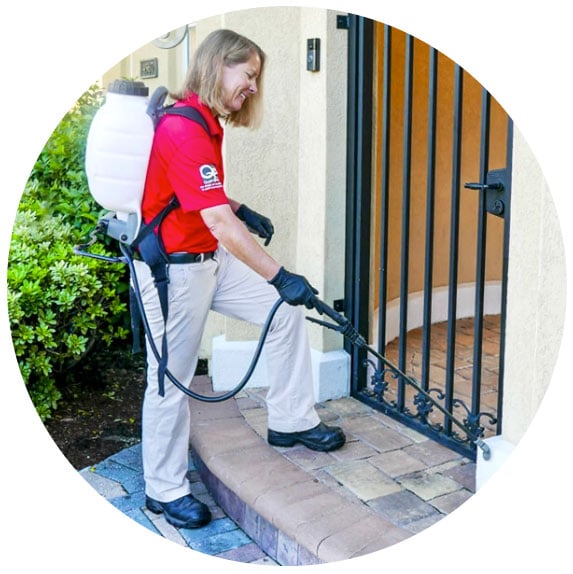Chinch bugs attack only one type of lawn, and that’s St. Augustine grass, the most common turf used in our area. In many parts of Florida, controlling chinch bugs is a year ‘round effort. For Northern Florida, chinch bugs are most common March – November when warm, sunny conditions increases chinch bug activity.
Since chinch bugs feed on and kill the grass, a homeowner’s first sign of chinch bugs is usually the appearance of round yellow or dying patches of grass in their lawn. As their host plant dies, chinch bugs move to neighboring grass plants to continue feeding creating dead patches that get larger over time. How fast the dead patches grow depends on the chinch bug infestation and overall health of the lawn.
Chinch bug damage may occur in open, sunny areas near sidewalks and driveways, but also in the middle of lawns. The damage is often confused with drought or frost stress. Other factors, such as disease, nematodes, nutritional imbalances, and drought can cause off-color areas to occur in lawns. Thus, the grass should be carefully examined to determine which corrective measures may be needed.
Controlling chinch bug populations begins by properly mowing your lawn and minimizing the amount of thatch. During grass growing season, mow your lawn weekly with a sharp lawnmower blade. If the thatch becomes too think (over 1 inch thick) speak with your lawn care service about having your lawn aerated.
Proper lawn maintenance including regular mowing, fertilization and proper irrigation can greatly reduce the susceptibility of St. Augustine grass to chinch bug infestations.
Lawns should be mowed frequently enough so that no more than 1/3 of the leaf blade is removed at each mowing. Moisture stress in lawns also encourages chinch bug infestations. Avoid over or under watering. Most lawns need ¾ inches of water 2 – 3 times per week.
Rapid growth caused from frequent applications of nitrogen fertilizers may increase chinch bug damage to your lawn by increasing chinch bug activity and causing a thick layer of thatch to develop in your lawn.
Chinch bugs can do more than damage your lawn, than can be costly as the dead turf will normally need to replaced with new sod.
To avoid this common threat to your lawn, contact Turner Pest Control and have their lawn professionals maintain your lawn’s health year ‘round. Turner Pest Control’s lawn experts analyze and treat every lawn individually. We can also take care of all your outdoor needs including lawn aerations, shrub treatments, fire ant elimination and mosquito control.

Ready for expert pest control? Find a Turner Pest Control location near you.